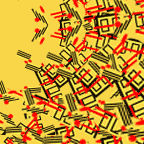
English 1907
Syllabus
| 29217-001 | |
| English 1907 | |
| Introduction to Literature | John D. Schwetman |
| Fall 2011 | jschwetm@d.umn.edu / Tel. 726-8437 |
| Solon Campus Center 120 | Office: Kirby Plaza 328 |
| Monday, Wednesday, Friday 3-3:50pm | Office Hours: Tuesday 10-10:50am |
| http://www.d.umn.edu/~jschwetm/fall2011/engl1907/ | Wednesday 10-10:50am |
| 3 credits | |
| This course satisfies the Liberal Education Requirement for Category 9. | |
Course Overview
This course will provide students with an introduction to fundamental concepts underpinning the study of literature from different time periods and cultures and across a variety of literary genres.
Objectives
During the semester, I expect students to achieve the following goals:
Understand and interpret texts from different literary genres and time periods.
Discuss these texts in the context of a classroom discussion or smaller group discussions.
Write convincing arguments about the meanings of these texts in examinations and the online discussion forum.
Recall key facts about the works in question including but not limited to the date of publication, the author, the title, and general topics.
Expectations
In order to accomplish these goals, students must
Read the required books carefully and take notes during lectures. (And, remember that there are rules against disseminating these notes beyond the classroom community, which you can find at "http://www.duluth.umn.edu/vcaa/ClassNotesAppropriateUseof.html".)
Attend class. I expect students to show up on time and prepared to discuss the readings assigned for that day. Students have a responsibility to plan their schedules to avoid excessive conflicts with course requirements. Excessive absences will have a negative impact on the grade that you receive in this course. Excusable absences include "subpoenas, jury duty, military duty, religious observances, illness, bereavement for immediate family and NCAA varsity college athletics." Please contact the instructor about anticipated absences in order to minimize their influence on your coursework. For more information on excused absences, see "http://www.d.umn.edu/vcaa/ExcusedAbsence.html"
Demonstrate a clear understanding of assigned works in three exams and through participation in an on-line discussion group. For additional information about policies governing final exams, see "http://www.d.umn.edu/vcaa/FinalExams.html".
Respect fellow students and refrain from behavior that might impair their learning opportunities. Any behavior that substantially and repeatedly interrupts the instructorÕs ability to teach or the studentsÕ ability to learn will result in appropriate penalties. Disruptive behavior includes inappropriate use of communications technology in the classroom, such as ringing cell phones, text-messaging, watching videos, playing computer games, doing email, or surfing the Internet on oneÕs computer instead of note-taking or other instructor-sanctioned activities. For further clarification of UMD policies in this regard, consult the Board of Regents Policy at "http://www1.umn.edu/regents/policies/academic/Student_Conduct_Code.pdf".
Treat instructors and fellow students with civility. UMD instructors and students have a responsibility to maintain a learning environment that is, as stated in the Teaching and Learning Policy, "respectful of the rights and freedoms of all members, and promotes a civil and open exchange of ideas." The full policy is available at "http://www.d.umn.edu/vcaa/TeachingLearning.html".
Grade Breakdown:
| Exam One | 25% |
| Exam Two | 25% |
| Exam Three (cumulative) | 40% |
| Participation | 10% |
Your grade will depend primarily on your written work and the understanding of the material that you convey through that work. A command of standard written English and the ability to present an argument will also contribute to the determination of your grade.
Late assignments will receive a deduction of 1/3 of a letter grade for each business day that they are late. Students who miss exams may not make them up without a valid excuse for the absence. Valid excuses include health emergencies and family crises. If students anticipate missing an exam or a paper deadline for a valid reason and consult with me in advance, I can consider exceptions on a case-by-case basis.
Academic dishonesty tarnishes the reputation of the University of Minnesota Duluth and discredits the accomplishments of its students. Because the university is committed to providing students every possible opportunity to grow in mind and spirit, it must insist on an environment of trust, honesty, and fairness. Consequently, all members of the academic community must regard any act of academic dishonesty as a serious offense. In keeping with this ideal, this course will adhere to UMD's Student Academic Integrity Policy, which is available online at "http://www.d.umn.edu/conduct/integrity/". This policy sanctions students engaging in academic dishonesty with penalties up to and including expulsion from the university for repeat offenders.
Individuals who have any disability, either permanent or temporary, which might influence their capacity to perform in this class, should inform me at the start of the semester. I can make special adaptations of teaching methods, assignments, materials, or testing as required to provide for equitable participation in the course. The Office of Disability Resources is also available to assist students with disabilities. It is located in 256 Kirby Student Center and on the web at "http://www.d.umn.edu/access/".Required Texts
Austen, Jane. Pride and Prejudice. 1813. New York: Oxford U. P., 2004. Print.
Chekhov, Anton. Uncle Vanya. 1897. Trans. Vlada Chernomordik and David Mamet. New York: Grove, 1988. Print.
Dickinson, Emily. Final Harvest: Emily Dickinson's Poems. Ed. Thomas H. Johnson. New York: Little, Brown, 1964. Print.
McCarthy, Tom. Remainder. New York: Vintage, 2005. Print.
O'Connor, Flannery. A Good Man Is Hard to Find and Other Stories. New York: Houghton Mifflin, 1977. Print.
Ryan, Kay. The Best of It: New and Selected Poems. New York: Grove, 2010. Print.
14 September 2011